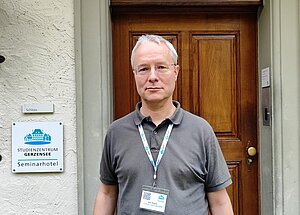
#TimetoMeet Dirk Niepelt
In our #TimetoMeet series we introduce members of the Gerzensee community and talk to them about their relationship with time. In this interview, it’s time to meet Dirk Niepelt, Professor of Macroeconomics at University of Bern and leader of the CEPR Research Policy Network on Fintech and Digital Currencies.
Dirk Niepelt, thank you for taking the time to talk to us.
In your opinion, what is the most important economic challenge of our time?
Dirk Niepelt: Securing property rights to reduce waste, suppression, and conflict.
Time is money, so as an economist what would you like to invest more time in?
Dirk Niepelt: Listening to philosophers.
And which activity do you find the biggest waste of time ?
Dirk Niepelt: Following directions by incompetent leaders, authorities.
If you had a free ride on a time machine, what year would you travel to?
Dirk Niepelt: Around 530 BCE to Croton.
Which is your favorite time of the year, and why?
Dirk Niepelt: Spring. I love seeing the morning light and leaves return. And the trees seem so happy.
What celebrity would you love to spend some time with?
Dirk Niepelt: ChatGPT lists as exemplary celebrities: Zendaya, Leonardo DiCaprio, Taylor Swift, Drake, Serena Williams, Lionel Messi, Charli D’Amelio, MrBeast, Oprah Winfrey, Elon Musk. So far, none of them came to my mind.
About our Interviewee:
Dirk Niepelt’s research covers topics in macroeconomics, monetary economics, as well as international and public finance. Dirk is currently a member of the Bank of England's CBDC Academic Advisory Group. He previously has also held visiting positions at the BIS, European Central Bank (ECB), International Monetary Fund (IMF), Federal Reserve Bank of St. Louis, and the Swiss National Bank.
But most importantly for us, Dirk Niepelt also served as our director here at the Study Center Gerzensee between 2010 – 2022! We were thrilled to welcome Dirk back to Gerzensee as the co-organizer of the second annual meeting of the CEPR Research Policy Network on Fintech and Digital Currencies.

#GerzenseeInsights "New Problems in Institution Design"
In our #GerzenseeInsights series, we offer key insights from selected Gerzensee academic events.
This time, we would like to share key lessons from our recent course, “New Problems in Institution Design", taught by Professor Philipp Strack of Yale University, from July 28 to August 1. This advanced economics course was targeted to PhD students, academic faculty members, and research economists in policy institutions. It covered advanced tools in mechanism design, focusing on topics such as privacy-preserving signals, non-discriminatory individual pricing, and learning with mis-specified models, among many others.
Insight 1: Statistical discrimination may occur across groups with identical skills
Two groups can earn different average wages even if they have the same average productivity, when the signals about their productivity differ in precision. Phelps (1972) and Aigner and Cain (1977) showed that when wages depend only on expected productivity given a signal, differences in signal precision across groups lead to systematically different outcomes. For example, suppose two equally productive groups, A and B, are evaluated by a person who knows group A better (e.g., group A consists of economists and the evaluator is an economist as well), thereby obtaining more precise signals while otherwise unbiased. The evaluator, aware of the noise, places less weight on extreme scores for group B and more weight on their overall average. As a result, high-ability individuals in group B are undervalued, while low-ability individuals are overvalued, shifting the group’s average wage. The inequality in outcomes arises purely from differences in information quality, not from actual productivity differences.
Insight 2: Preserving privacy using informative signals is possible
Sometimes we want to learn about someone’s skill without simultaneously revealing protected characteristics such as race or gender. The difficulty is that many observable signals — test scores, work samples, even speech patterns — are statistically correlated with these characteristics, allowing unintended inferences about those protected characteristics. Privacy-preserving signals are designed to be informative about the target variable (skill) while limiting what can be inferred about sensitive attributes. A powerful approach is to rely on quantiles: for instance, suppose college applicants reveal only the quantile of their test score within their protected group (e.g., Black females). Because quantiles are uniformly distributed across groups, this conveys information about the applicant’s skill while revealing nothing about their group membership. Strack and Yang (2024) prove that a signal is privacy-preserving if and only if it is a garbling (a transformation with less information) of a reordered quantile signal.
Insight 3: Learning from misspecied models is still useful
Interpreting data always requires a model. But what if the model is misspecified — not even allowing the possibility of the true state? Berk’s theorem (1966) shows that in such cases, the maximum-likelihood estimator still converges to the pseudo-true parameter: the point in the model class that minimizes the Kullback–Leibler divergence from the truth. In other words, estimation delivers the “closest” approximation to reality within the chosen family, in terms of information loss. This is encouraging: since all models are, to some degree, wrong, the theorem reassures us that learning from data can nevertheless improve forecasts.
Insight 4: But learning can be self-defeating when using a misspecifed model
Even though learning can improve forecasting even with misspecified models, it does not follow that learning always leads to better outcomes. For example, Heidhues et al. (2018) show that overconfidence can lead to self-defeating learning. When team members work together, they observe results and update their beliefs about each other’s abilities. If one member is overconfident in her ability (hence using a misspecified model), she will attribute poor team performance to her teammate having low skills. In turn, she will allocate more and more tasks to herself. This self-reinforcing dynamic produces increasingly disappointing outcomes, further entrenching the misdirected learning. The initial overconfidence thus leads to a misallocation of tasks: one team member ends up doing the bulk of the work, even though collaboration would have been more efficient. This illustrates that, under misspecified models, more learning can be self-defeating and lead to worse outcomes.
Selected References:
- Aigner, D. J., & Cain, G. G. (1977). Statistical Theories of Discrimination in Labor Markets. Industrial and Labor Relations Review, 30(2), 175–187
- Berk, R. H. (1966). Limiting Behavior of Posterior Distributions when the Model is Incorrect. Annals of Mathematical Statistics, 37(1), 51–58
- Heidhues, P., Köszegi, B., & Strack, P. (2018). Unrealistic Expectations and Misguided Learning. Econometrica, 86(4), 1159–1214
- Phelps, E. S. (1972). The Statistical Theory of Racism and Sexism. American Economic Review, 62(4), 659–661
- Strack, P., & Yang, K. H. (2024). Privacy Preserving Signals. Econometrica, 92(6), 1907–1938
This summary was compiled by Remo Taudien. Remo is an academic assistant at the Study Center Gerzensee and a PhD student at the University of Bern.
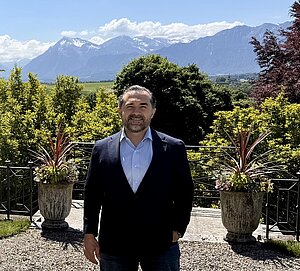
#GerzenseeInsights “Recent Advances in Economic Growth"
In our #GerzenseeInsights series, we offer key insights from selected Gerzensee academic events.
This time, we would like to share key lessons from our recent course, “Recent Advances in Economic Growth", taught by Professor Ufuk Akcigit of the University of Chicago. This advanced economics course targeted PhD students, academic faculty members, and research economists in policy institutions.
Insight 1: Slower knowledge diffusion can explain why productivity growth has stagnated despite a rise in inventors. In the U.S., the number of inventors has grown over the past 20 years, while productivity growth has declined. Akcigit and Ates (2023) build a model featuring endogenous innovation, firm competition, and knowledge diffusion to explore this disconnect. Among several factors – ranging from lower corporate taxes, changes in entry costs, and lower worker bargaining power – they find that only reduced knowledge diffusion can jointly explain various empirical patterns. Indeed, evidence points to market leaders increasingly relying on intellectual property protections to block knowledge spillovers.
Insight 2: Inventors employed by large incumbent firms are not as inventive as their peers hired by smaller entrant firms. U.S. data shows that a growing share of inventors are employed by large incumbent firms, partly because they pay a higher salary – a so-called “incumbent premium.” Unfortunately, these inventors are less productive (as measured by both the quantity and quality of inventions) than the ones hired by smaller firms. For example, inventors produce 8% fewer patents 4 years after being hired by a large incumbent than a comparable inventor hired by a small entrant. However, a large fraction of R&D subsidies go precisely to firms with more than 1000 employees. This suggests that public R&D funds are misallocated and young firms in which inventors can be particularly productive are at a disadvantage when it comes to public R&D funding and promising startups grow significantly slower when their inventors are poached by large incumbent firms (Akcigit and Ates, 2023 and Akcigit and Goldschlag, 2023).
Insight 3: Industrial policy directed at incumbent firms negatively impacts innovation and productivity growth. In addition to looking at relationships in the data (see previous bullet), the question of which firms should be targeted with industrial policy can also be studied in general equilibrium models. This not only allows researchers to understand the role of firm-level heterogeneity but also to conduct counterfactual exercises to analyze the effects that hypothetical policies would have on productivity and welfare. Using such a model, calibrated to match various features of the US economy, one can show that a very effective policy is to tax operation costs of incumbent firms rather than providing subsidies. The main reason for the desirability of such taxes is that they encourage the exit of inefficient incumbents, which releases skilled labor for other incumbents and new entrants. Once again, these results suggest that the current system, where large incumbents are the primary beneficiaries of R&D subsidies, may not necessarily be the most efficient use of public resources.
Insight 4: Education is essential for training R&D workers and preparing transformative entrepreneurs. Using Danish administrative data, Akcigit et al. (2025a) identify the factors that influence the decision to become either an entrepreneur or an inventor. While entrepreneurship is largely driven by IQ and parental entrepreneurial activity, the likelihood of becoming an R&D worker is strongly associated with IQ and educational background. Moreover, “transformative entrepreneurs” – those who create businesses to innovate and grow – tend to have higher IQs than “subsistence entrepreneurs.” The authors develop a model of firm dynamics and occupational choice that reflects these patterns. The model underscores the crucial role of education in fostering innovation and productivity. Education is not only essential for training R&D workers but also for preparing transformative entrepreneurs, who ultimately employ those workers. Alleviating financial constraints that limit access to higher education enables this synergy between entrepreneurs and inventors. According to the model, such a policy is the most effective means of spurring economic growth, particularly when public budgets are tight. A symbiotic relationship between entrepreneurs and inventors is crucial for a vibrant, dynamic, and progressive society.
Insight 5: Politically connected firms hinder business dynamism and innovation. Using micro-level data on Italian firms and politicians, Akcigit et al. (2023) study the impact of having local politicians being simultaneously employed in private companies on productivity dynamics. Several key findings emerge. First, more politically connected industries exhibit lower rates of firm entry. Second, industries with more political connections grow more slowly and are less productive. Finally, firms with more politically connected employees exhibit a higher probability of survival. These results suggest that political connections can distort market mechanisms by allowing less productive firms to survive and making it harder for new firms to enter the market.
Selected References:
Akcigit, Ufuk, and Sina T. Ates. "What happened to US business dynamism?." Journal of Political Economy 131.8 (2023): 2059-2124.
Akcigit, Ufuk, and Nathan Goldschlag. Where have all the" creative talents" gone? Employment dynamics of us inventors. No. w31085. National Bureau of Economic Research, 2023.
Akcigit, Ufuk, Salomé Baslandze, and Francesca Lotti. "Connecting to power: political connections, innovation, and firm dynamics." Econometrica 91.2 (2023): 529-564.
Akcigit, Ufuk, Harun Alp, Jeremy Pearce, and Marta Prato. “Transformative and Subsistence Entrepreneurs: Origins and Impacts on Economic Growth”. No w33766. National Bureau of Economic Research, 2025
This summary was compiled by Michael Barczay. Michael is a research associate and teaching assistant at the Study Center Gerzensee and PhD candidate in Economics at the European University Institute (EUI) in Florence, Italy.
#GerzenseeInsights “An Introduction to Macroeconomics with Household Heterogeneity”
In our #GerzenseeInsights series, we offer key insights from selected Gerzensee academic events. This time, we would like to share key lessons from our recent course, “An Introduction to Macroeconomics with Household Heterogeneity”, taught by Professor Dirk Krueger of the University of Pennsylvania, from December 16 to December 20. This advanced economics course targeted PhD students, academic faculty members, and research economists in policy institutions. It covered the basic building blocks of heterogeneous agent models and explored selected applications of these models.
Insight 1: Households react too much to changes in expected permanent income. Household income over the life cycle typically follows a hump-shaped pattern: rising during early working years, peaking in middle age (around the 50s), and declining as individuals approach retirement. The Permanent Income Hypothesis (PIH) (e.g., Friedman, 1957; Hall, 1978) predicts that households should smooth consumption over their lifetime—borrowing when young, saving during peak earning years, and dissaving in retirement. However, household consumption also exhibits a hump-shaped pattern, closely mirroring income. This discrepancy, known as the "excess sensitivity puzzle," suggests that households respond more to predictable income changes than the PIH envisages. This puzzle can be partly explained through the lens of heterogeneous agent models, which account for factors such as liquidity constraints faced by younger households (Zeldes, 1989; Deaton, 1991) and precautionary saving motives (Gourinchas and Parker, 2002).
Insight 2: Wealth inequality matters for the cost of recessions. In classical representative agent models, the costs of recessions and business cycles are often considered small. For instance, Lucas (1987) estimated that households would be willing to give up less than 1% of their consumption to insure against business cycle fluctuations. The reason is that as household income falls, they can dissave, thus stabilizing consumption. However, Krueger et al. (2016) challenge this view, demonstrating that the costs of business cycle fluctuations can be substantially higher in a richer heterogeneous agent framework. Surprisingly, low-wealth households, despite holding virtually no assets, can disproportionately drive aggregate consumption due to sharp increases in their savings as the recession hits.
Insight 3: The end of the American dream? Educational reforms can have large effects on lifetime consumption. The U.S. currently experiences low intergenerational earnings and education mobility, coupled with high child poverty. Is this the end of the American dream? Maybe, but two policy proposals give hope: Investments in better primary and secondary education and free access to tertiary education. Krueger et al. (2024) quantify the effects of introducing these two measures, using a rich heterogeneous-agent model. They find that the average lifetime consumption increase for newborns ranges from 11% to 15%. Furthermore, the reforms are self-financing over the long horizon but require access to additional government borrowing. Surprisingly, if forced to choose between either of the two reforms, better schooling yields higher welfare gains, which are also more equitably distributed but take longer to materialize. However, according to Krueger et al. (2024), an optimal approach involves a balanced split between the two policies.
Insight 4: A driving force in many heterogeneous agent models is precautionary savings. A key feature of many heterogeneous agent models is that households receive different income realizations, which, often by assumption, are not perfectly insurable. This induces consumption risk which, because households are assumed to be risk-averse, is undesirable to them. Households can reduce this consumption risk by engaging in precautionary savings—additional savings motivated by the need to self-insure against income risk. However, whether households effectively translate this risk aversion into higher precautionary savings depends on two factors: the shape of their utility function and the presence of borrowing constraints.
References
- Deaton, A. (1991). Saving and Liquidity Constraints. Econometrica, 59(5), 1221-1248.
- Gourinchas, P.-O., & Parker, J. A. (2002). Consumption Over the Life Cycle. Econometrica, 70(1), 47-89.
- Friedman, M. (1957). A Theory of the Consumption Function. Princeton University Press.
- Hall, R. E. (1978). Stochastic Implications of the Life Cycle-Permanent Income Hypothesis: Theory and Evidence. Journal of Political Economy, 86(6), 971-987.
- Krueger, D., Ludwig, A., & Popova, I. (2024). Shaping Inequality and Intergenerational Persistence of Poverty: Free College or Better Schools. Working Paper.
- Krueger, D., Mitman, K., & Perri, F. (2016). Macroeconomics and Household Heterogeneity. Working Paper.
- Lucas, R.E. (1987). Models of Business Cycles. Wiley-Blackwell.
- Zeldes, S. P. (1989). Consumption and Liquidity Constraints: An Empirical Investigation. The Journal of Political Economy, 97(2), 305-346.
This summary was compiled by Remo Taudien. Remo is an academic assistant at the Study Center Gerzensee and a PhD student at the University of Bern.

New Year’s Post 2025
From the Study Center in Gerzensee we wish you a prosperous 2025! We are looking forward to an exciting new year of academic activity!
Central Bankers Courses
We have planned an attractive program of courses for central bank staff with 175 selected participants from 78 central banks all over the world. We will offer three courses for mid-level managers on Monetary Policy & Exchange Rates, Banking Regulation, and Financial Markets. We will also offer three courses for analysts and researchers on Empirical Finance, Monetary Economics, and Macroeconomic Forecasting.
Graduate Training
The 2024/2025 edition of our Swiss Program for Beginning Doctoral Students is well underway with 30 students from 9 universities. We eagerly anticipate the return of all students as well as our outstanding lecturers. Prof Fernando Alvarez (University of Chicago) will be the first lecturer to visit Gerzensee in the new year!
We are delighted to announce our 2025 Program of Advanced Courses in Economics with courses on Causal Inference, Development Economics, Economic Growth, Bayesian Financial Econometrics; Mechanism Design, Monetary & Fiscal Policy with Heterogenous Agents, and Household Finance. PhD students, faculty members and research economists are welcome to apply!
Our 2025 Program of Law and Economics Courses will include courses on consumer contracts and evidence-based research. PhD students, faculty members and research economists are welcome to apply!
Gerzensee Forum
This spring we will host a Conference on Financial Intermediation jointly organized with BIS, CEPR and SFI. The preliminary program is available here.
In October we will host our biannual Conference on Macroeconomics, co-organized with the Journal of Economic Dynamics & Control, Federal Reserve Bank of St. Louis, and the Swiss National Bank. Don’t miss our call for papers, which will be out soon.
We especially look forward to welcoming researchers attending symposia and workshops we host for our partner research networks: CEPR and the Swiss Finance Institute.
Looking forward to seeing you!
#GerzenseeInsights
In our #GerzenseeInsights series we offer key insights from selected Gerzensee academic events. This time we would like to share key lessons from our recent course on Tax Systems taught by Professor Joel Slemrod of the University of Michigan on September 30 to October 4. This advanced course in economics was targeted to PhD students, academic faculty members and research economists in policy institutions and covered recent theoretical and empirical advances on how to finance public services.
Insight 1: Who is responsible for tax remittance matters! In theoretical models of public finance, it usually does not matter who transfers the tax payment to the authorities. For example, the theory suggests that it is irrelevant for tax incidence and revenue whether employers or employees remit payroll taxes. However, there is ample evidence that the choice of who remits a tax matters for the tax revenue collected or the amounts distributed through benefit programs. So who remits has an impact on compliance and tax revenue, even if it is not theoretically expected to do so. For example, Kopczuk et al. (2016) show that the incidence and revenue collected from diesel taxes in the United States depend on whether the refiner, wholesaler, distributor, retailer, or consumer remits the tax to the government. Recent work by Garriga and Tortarolo (2024) shows that shifting the payment of child benefits from employers to the government increased the amount received by individuals. An important argument for why the theoretical "remittance invariance folk wisdom" does not hold in reality is that evasion opportunities differ across transaction parties. For example, if it is easier for employees to misreport their earned income than it is for employers, then a change from requiring the employee to remit the tax to the government to requiring the employer to remit the tax may have a positive effect on tax revenues.
Insight 2: Reported income underestimates measures of income inequality. Indeed, if individuals along the income distribution engage in different degrees of tax avoidance, this can have important implications for income inequality as well as effective tax progressivity, as measured by administrative tax returns. However, since the goal of tax avoidance is to hide income, it is notoriously difficult to measure and to study. Johns and Slemrod (2010) use data from the National Research Program's Tax Reporting Compliance Study to show that misreporting increases with income (at least up to the 99.0 to 99.5 income percentiles). This suggests that income inequality as measured by reported income is lower than true income inequality. More recent work (e.g., Alstadsæter et al. (2019)) argues that the data used by John and Slemrod misses sophisticated tax evasion at the top of the income distribution, suggesting that the difference between measured and reported income inequality may be even larger.
Insight 3: Electronic payments facilitate tax collection. It is well known that cash transactions make it easier to underreport or misreport the transaction to tax authorities. Therefore, programs that discourage the use of physical cash can affect reported income and, therefore, tax revenues collected. Electronic payments can increase both the perceived and actual likelihood that the tax authority will be able to monitor a transaction. Evidence from around the world suggests that encouraging the use of electronic transactions can increase tax compliance and tax revenues, and that these effects are substantial. For example, Hess (2020) shows that when U.S. states moved to distribute cash transfers electronically, reported taxable income increased between $0.56 and $1.15 for every dollar that was replaced by electronic payments. Similar effects have been observed in very different contexts. For example, when India introduced its demonetization policy in 2016, reported sales increased and so did tax revenues (Das et al., 2023).
Insight 4: Tax collectors can also benefit from big data. While administrative tax data are often necessary for the analysis of tax systems, there is ample convincing evidence that more readily available data sources can be used, or that these alternative sources can be combined with more traditional tax data. Most empirical work analyzing tax systems relies on administrative data provided by tax authorities. These data are often of high quality and cover a large proportion of (if not all) taxpayers. However, accessing this data can be challenging. The good news is that there are numerous examples where more accessible data sources have been used to provide rigorous evidence on tax policy. For example, data from search queries on Google, Wikipedia, and IRS information services have been used to better understand when and how taxpayers acquire information (Hoopes et al., 2015). Cullen, Turner, and Washington (2021) show how combining IRS tax data with more readily available survey data and voting records can provide interesting insights into how the political alignment of U.S. counties with the party of the president affects tax evasion in these counties.
References
- Alstadsæter, Annette, Niels Johannesen, and Gabriel Zucman. “Tax evasion and inequality.” American Economic Review 109.6 (2019): 2073-2103.
- Cullen, Julie Berry, Nicholas Turner, and Ebonya Washington. “Political alignment, attitudes toward government, and tax evasion.” American Economic Journal: Economic Policy 13.3 (2021): 135-166
- Das, Satadru, et al. “Does going cashless make you tax-rich? Evidence from India’s demonetization experiment.” Journal of Public Economics 224 (2023): 104907.
- Garriga, Santiago and Tortarolo, Dario. “Wage Effects of Means-Tested Transfers: Incidence Implications using Firms as Intermediaries.” Working Paper (2024). Accessed on Oct. 17, 2024 at: https://economics.dtortarolo.com.ar/1stVersion_14.pdf
- Hess, Ryan. “Cash and tax evasion.” Proceedings. Annual Conference on Taxation and Minutes of the Annual Meeting of the National Tax Association. Vol. 113. National Tax Association, 2020.
- Hoopes, Jeffrey L., Daniel H. Reck, and Joel Slemrod. “Taxpayer search for information: Implications for rational attention.” American Economic Journal: Economic Policy 7.3 (2015): 177-208.
- Johns, Andrew, and Joel Slemrod. "The distribution of income tax noncompliance." National Tax Journal 63.3 (2010): 397-418.
- Kopczuk, Wojciech, et al. “Does tax-collection invariance hold? Evasion and the pass-through of state diesel taxes.” American Economic Journal: Economic Policy 8.2 (2016): 251-286.
This summary was compiled by Michael Barczay. Michael is an academic assistant at the Study Center Gerzensee and a PhD student at the European University Institute.
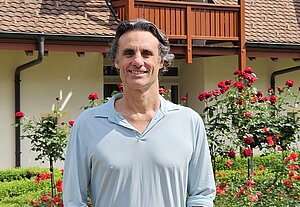
#TimetoMeet Andrea Prat
In our #TimetoMeet series we introduce members of the Gerzensee community and talk to them about their relationship with time. In this interview, it’s time to meet Andrea Prat, Professor of Economics at Columbia University and chair of the organizing committee of the European Summer Symposium in Economic Theory.
Andrea Prat, thank you for taking the time to talk to us.
In your opinion, what is the most important challenge of our time?
Andrea Prat: Humanity faces many crises: climate change, armed conflicts, financial instability, pandemics, and more. I think there exist tools to tackle those crises, but the real challenge is to create global institutions that can develop those tools.
Time is money, so as an economist what would you like to invest more time in?
Andrea Prat: It’s an issue I am very interested in. I have done some research on time use in organizations (Bandiera et al, CEO Behavior and Firm Performance, Journal of Political Economy, 2020). We collected the time use of over 1100 CEOs of medium/large firms and studied how it affects the performance of the firms they run. Successful CEOs are those who devote most of their time to activities that generate alignment and coordination within the firm. They are the true leaders.
And which activity do you find the biggest waste of time ?
Andrea Prat: The same research reveals that the worst CEOs are the micromanagers. They focus on the trees but miss the forest. Their firms end up underperforming.
If you had a free ride on a time machine, what year would you travel to?
Andrea Prat: 2092. I am incredibly curious about the future. Plus, I would love to attend the 100th edition of ESSET!
Which is your favorite time of the year, and why?
Andrea Prat: Definitely summer. I love swimming in open bodies of water, especially Gerzensee.
About our Interviewee:
Andrea Prat is the Richard Paul Richman Professor of Business at Columbia Business School and Professor of Economics at the Department of Economics, Columbia University. Professor Prat's work focuses on organizational economics and political economy. His research in organizational economics explores issues such as organizational design, corporate leadership, employee motivation, and optimal disclosure. His research in political economy examines the influence of the media industry on the democratic process. He is the author of numerous articles in leading journals including the American Economic Review, Econometrica, the Journal of Political Economy, the Quarterly Journal of Economics, the Journal of Finance, and the Review of Economic Studies.
Andrea Prat chairs the organizing committee of the CEPR European Summer Symposium in Economic Theory (ESSET) which takes place each July in Gerzensee. For more than 30 years now, ESSET has brought together leading economists to discuss the frontier of research in economic theory. In Gerzensee.
#TimetoMeet Professor Philipp Harms

In our #TimetoMeet series we introduce members of the Gerzensee community and talk to them about their relationship with time. In this interview, it’s time to meet Philipp Harms, Professor of International Economics at the University of Mainz and regular lecturer in the central bankers course program at Gerzensee.
Philipp Harms, thank you for taking the time to talk to us.
In your opinion, what is the most important challenge of our time?
The biggest challenge of our time is to sustain peace and international cooperation. There are enormous problems that mankind has to solve (the looming climate crisis, the aging of societies etc.) and that require a joint effort of all countries.
Time is money, so as an economist what would you like to invest more time in?
I definitely could use more time to read other scientists’ work. The privilege of being in academia is the possibility to absorb and to reflect on your colleagues’ innovative and inspiring thoughts. Unfortunately, daily business leaves you little time to fully take advantage of this.
And which activity do you find the biggest waste of time?
Preparing and sitting through faculty meetings.
If you had a free ride on a time machine, what year would you travel to?
Leipzig, Good Friday of 1727, when Johann Sebastian Bach’s St. Matthew Passion was performed for the first time. Oddly (and shockingly) nobody publicly acknowledged the breathtaking quality of this masterpiece during Bach’s lifetime. I would have loved to step in.
Which is your favorite time of the year, and why?
Actually, my favorite time of the year is the time when I usually teach at Gerzensee (early March). Winter is slowly giving way to spring, the first flowers are blossoming on the Study Center premises, the Swiss Alps are still covered with snow, but there are already some warm days to enjoy. Nature is full of hope and promise.
About our Interviewee:
Philipp Harms is a professor at Johannes Gutenberg University Mainz since 2010. His research interests include international economics, political economy, and development economics. Professor Harms is also the author of a textbook on International Macroeconomics. Since 2002 Philipp Harms has been a regular lecturer in our Central Bankers Course program. This year he has taught in our course on Monetary Policy, Exchange Rates and Capital Flows for mid-level central bank managers. Philipp Harms is also an alumnus and previous employee of Gerzensee. In 1995 / 1996 he completed our prestigious Swiss Program for Beginning Doctoral Students in Economics. In 2003 / 2004 he was responsible for organizing our program of Advanced Courses in Economics.
New Year’s Post 2024

From the Study Center in Gerzensee we wish you a prosperous 2024! We are looking forward to an exciting new year of academic activity. Here’s a preview of what we have planned for this year.
Central Bankers Courses
This year, we are again offering an exciting program of courses for central bank staff. 112 selected participants from all over the world will take part in our four courses for mid-level managers on Monetary Policy & Exchange Rates, Monetary Theory & Policy, Financial Stability, and Financial Markets. We will also welcome 56 selected participants to our courses for analysts and researchers on Inflation Forecasting, and Monetary Economics.
Graduate Training
We are delighted to announce that Cristina Arellano (Minneapolis Fed and University of Minnesota) will join the faculty of our Swiss Program for Beginning Doctoral Students this year. Prof. Arellano will teach our course on international macroeconomics.
We are also excited to announce our 2024 Program of Advanced Courses in Economics with courses on Corporate Behavior; Survey Data in Economics & Finance; The Economics of Digital Markets; Machine Learning for Treatment Effects; Trade & Growth; Tax Systems; or Macroeconomics with Household Heterogeneity. PhD students, faculty members and research economists are welcome to apply!
Our 2024 Program of Law and Economics Courses while include courses on International Law as well as Law, AI & Machine Learning.
Gerzensee Forum
This May we will host a Conference on Financial Intermediation jointly organized with BIS, CEPR and SFI.
In October we will host our biannual Conference on Monetary Economics, co-organized with the Journal of Monetary Economics and the Swiss National Bank. Don’t miss our call for papers for this conference, which will be out soon.
And in between, we look forward to welcoming researchers attending symposia and workshops we host for our partner research networks: CEPR and the Swiss Finance Institute.
Can’t wait to meet you!
End of year post 2023

At the Study Center in Gerzensee we are getting ready to close the gates for this year. We look back on a busy, and exciting year of academic activities.
This year we hosted 159 central bankers from 73 countries in our continuing education program. 35 graduate students completed our renowned program for beginning doctoral students and 28 more are well on their way to complete the 2023/2024 program. 133 participants took part in our advanced courses in economics and law and economics. And numerous scholars visited the study center for research conferences, workshops and research retreats. Thank you all for coming.. it was wonderful having you with us!
While we get the study center sparkling for the new year, we leave you with one final impression of 2023. This year, Prof. Florencia Marotta-Wurgler was one of the outstanding global scholars to spend time in Gerzensee. In October, she gave a course on the Law & Economics of Consumer Contracts and Privacy. And she also found time for an interview which we can now share with you. Listen to what Florencia Marotta-Wurgler has to say on why she studied law after economics, how she supports female students in law school, and how the internet has changed the law and economics of consumer contracts.
Listen to the podcast here.
See you next year!
New Year’s Post 2023
From the Study Center in Gerzensee we wish you a prosperous 2023! In our new year’s post, we present our interview with a featured guest of 2022. We also preview our 2023 academic program. For a regular update on ongoing activities at the Study Center: Follow us on LinkedIn.
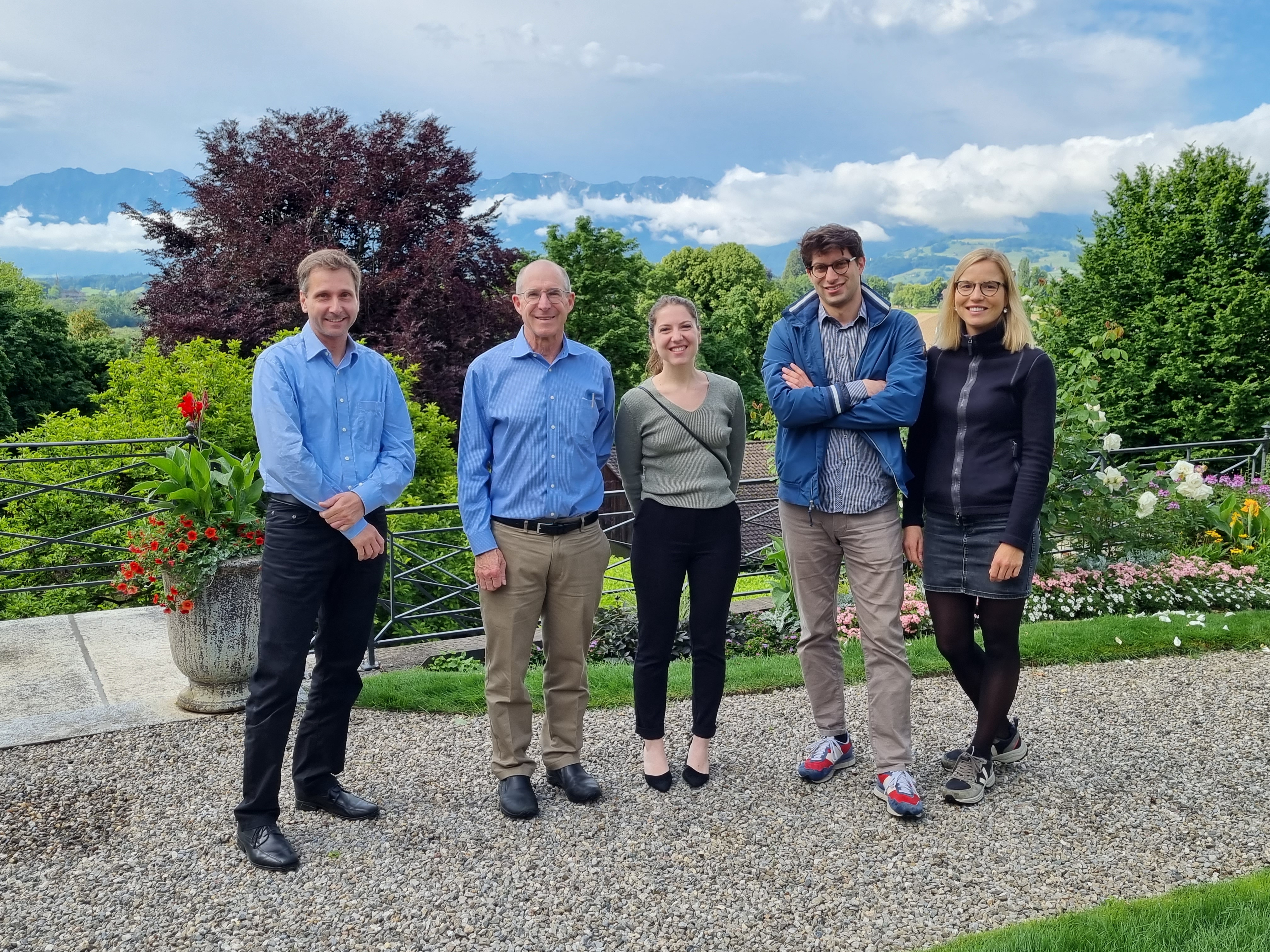
Featured guest of 2022: Prof. James H. Stock (Harvard University)
In June 2022, we welcomed Prof. James Stock to the Study Center to give an advanced course on “The Economics and Econometrics of Climate Change Policy ”. During his stay, Prof. Stock found time to talk to us about his experience as an advisor on climate policy, and his visit to the Study Center.
Listen to the podcast here.
Interview: June 2022, Moderator: Fabio Canteg.

Central Bankers Courses in 2023
In 2023, we again offer a program of courses for central bank staff from all over the world. We look forward to welcoming in total 173 participants from 73 central banks to our intermediate courses on Monetary Policy, Banking Regulation, Macroeconomic Forecasting, Instruments of Financial Markets, as well as to our Topics courses in Empirical Finance and Monetary Economics.

Graduate Training in 2023
We are delighted to announce that Prof. Anna Mikusheva (MIT) and Prof. Stephanie Schmitt-Grohé (Columbia University) will join the faculty of our Swiss Program for Beginning Doctoral Students during the coming year. We wave goodbye to Prof. Mark Watson (Princeton) and Prof. Sérgio Rebelo (Northwestern) and thank them for their long-standing and incommensurable contribution to our core graduate training program. They will be missed.
We are also excited to announce our 2023 Program of Advanced Courses in Economics with courses on Policy Evaluation, Inequality, International Macro, FinTech, Computation of Heterogenous Agent Models and Probabilistic Modeling of Networks.
Our 2023 Program of Law and Economics Courses is currently being finalized and will be announced within the next weeks.
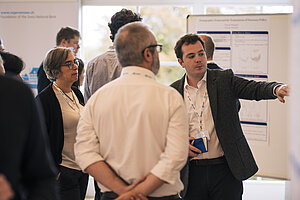
Conferences in 2023
We are excited to host for the first time the Swiss Winter Conference on Financial Intermediation.
Also for the first time, we will host the Summer Workshop on Money, Banking, Payments and Finance, co-organized with the Bank of Canada and the FED Board of Governors.
We look forward to our biannual autumn Conference with the Journal of Economic Dynamics and Control, co-organized with the Fed St. Louis and the Swiss National Bank.
Newsletters 2010-2022
January 2022, February 2021, February 2020, February 2019, January 2018, January 2017, January 2016, January 2015, January 2014, January 2013, January 2012, January 2011, January 2010
